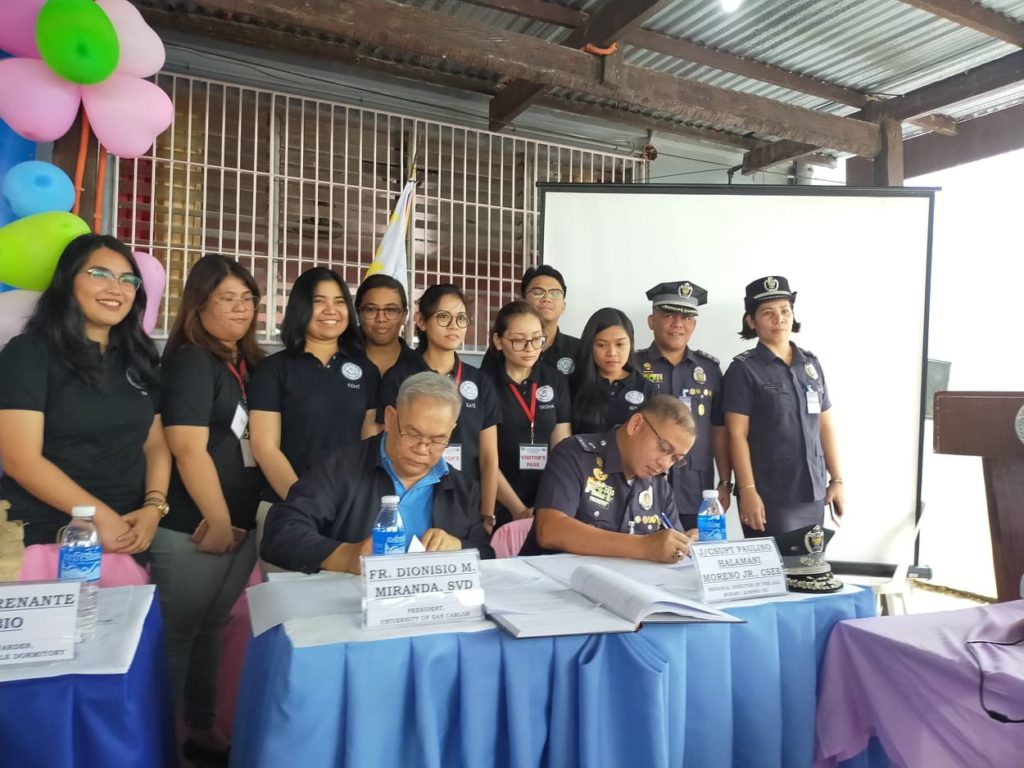
Fr. Rogelio Bag-ao, University of San Carlos director for community extension service, and Jail Chief Superintendent Paulino Halamani Moreno Jr., Bureau of Jail Management and Penology regional director, sign a memorandum of understanding to help reduce jail congestion at the Cebu City Jail. Also in the photo, (standing) are the law student volunteers; Jail Superintendent Renante Rubio (second from right), the Cebu City jail warden male dormitory; and Jail Chief Inspector Elsie Eireen Alcomendras (right), jail warden of female dormitory. CDN Digital photo | Irene R. Sino Cruz
CEBU CITY—The Cebu City Justice Zone marked its first anniversary with the signing of a memorandum of understanding between the Bureau of Jail Management and Penology (BJMP) and the University of San Carlos (USC) that aims to address the congestion in the male and female dormitory of the Cebu City Jail.
Jail Chief Superintendent Paulino Halamani Moreno Jr., BJMP regional director for Central Visayas, and Fr. Dionisio Miranda, USC director for community extension service, signed the MOU during the Justice Zone’s anniversary celebration on Friday, October 11, 2019, at the BJMP female dormitory.
Under the MOA, USC volunteer law students would study the records of inmates at the Cebu City Jail to determine who among persons deprived of liberty (PDLs) involved in crimes against property could avail of reduced sentence, explained Regional Trial Court (RTC) Executive Judge Macaundas Hadjirasul, convenor of the Cebu City Justice Zone.
The initial efforts by the USC law students resulted in the release of six PDLs, according to Hadjirasul. Around 50 volunteers who are USC law students would be involved in the undertaking.
The justice zone is supported by the Governance in Justice (GOJUST), a cooperative program between the European Union and the Philippine government.
Read: SC declares Cebu City as Justice Zone
One of its goal is to help strengthen the Philippines’ formal justice system through increased efficiency, effectiveness and accountability.
The project’s implementing government agencies are the Supreme Court of the Philippines, the Department of Justice and the Department of Interior and Local Government while the program beneficiaries are the Justice Sector Coordinating Council and its member institutions.
Hadjirasul explained that the justice zone is a local counterpart of the Justice Sector Coordinating Council, with the five pillars of the justice systems as members. These are the community, law enforcement, courts and the correction facilities.
The justice zones were first piloted in the cities of Cebu, Quezon and Davao.
After the justice zone was set up in Cebu City in October 4, 2018, he noted that there were increased coordination; sharing of ideas and information; discussion of problems and issues; and finding solutions to the concerns.
The Cebu City Justice Zone helped address the various concerns in the jail facilities such as the lack of water in the Cebu City Jail male dormitory; the hospitalization and medical examination of PDLs and the setting up of an interview area for lawyers to consult with the PDLs.
Meanwhile, GOJUST provided funding for various Cebu City Justice Zone projects. These include the training of personnel from the BJMP, Cebu Provincial Detention and Rehabilitation Center, and Parole and Probation Administration.
Another project involved the use of the alcohol substance smoke involvement screening test brief intervention (ASSIST-BI) tool to fast-track processing of plea bargaining as required by the Supreme Court guidelines on plea bargaining.
GOJUST team leader Christian Eldon lauded the efforts of the Cebu City Justice Zone. “On your first year, your gains clearly demonstrate that coordination and cooperation at the local level makes justice delivery swifter and more efficient,” Eldon said. /bmjo